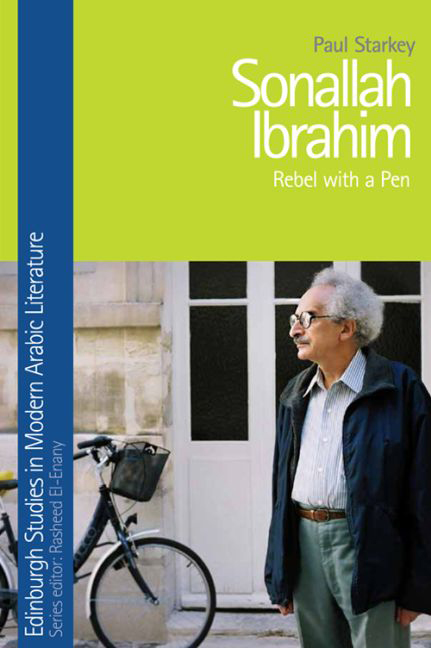Book contents
- Frontmatter
- Contents
- Series Editor's Foreword
- Preface
- 1 Introduction: Background and Context
- 2 Rebel with a Pen
- 3 Cairo Prison: Tilka al-raʾiha (1966)
- 4 Michelangelo and the Dam: Najmat Aghustus (1974)
- 5 CocaColaland: al-Lajna (1981)
- 6 War in Lebanon: Bayrut, Bayrut (1984)
- 7 Consumer Society: Dhat (1992)
- 8 Prison of Dishonour: Sharaf (1997)
- 9 Widening Horizons (1): Sex, Memory and Revolution: Warda (2000)
- 10 Widening Horizons (2): In the Land of the Capitalists: Amrikanli (Amri Kan Li) (2003)
- 11 Return to Childhood: al-Talassus (2007)
- 12 The French Connection: al-ʿImama wa-al-Qubbaʿa (2008) and al-Qanun al-Faransi (2008)
- 13 Filling a Gap: al-Jalid (2011)
- 14 Epilogue
- Bibliography
- Index
14 - Epilogue
Published online by Cambridge University Press: 23 September 2017
- Frontmatter
- Contents
- Series Editor's Foreword
- Preface
- 1 Introduction: Background and Context
- 2 Rebel with a Pen
- 3 Cairo Prison: Tilka al-raʾiha (1966)
- 4 Michelangelo and the Dam: Najmat Aghustus (1974)
- 5 CocaColaland: al-Lajna (1981)
- 6 War in Lebanon: Bayrut, Bayrut (1984)
- 7 Consumer Society: Dhat (1992)
- 8 Prison of Dishonour: Sharaf (1997)
- 9 Widening Horizons (1): Sex, Memory and Revolution: Warda (2000)
- 10 Widening Horizons (2): In the Land of the Capitalists: Amrikanli (Amri Kan Li) (2003)
- 11 Return to Childhood: al-Talassus (2007)
- 12 The French Connection: al-ʿImama wa-al-Qubbaʿa (2008) and al-Qanun al-Faransi (2008)
- 13 Filling a Gap: al-Jalid (2011)
- 14 Epilogue
- Bibliography
- Index
Summary
Alexander Tvardovsky – ‘The hero of my tale, whom I love with all my heart, whom I have tried to depict in all his beauty, who was, is, and will be beautiful, is the truth.’
Tolstoy (as quoted by Sonallah Ibrahim in his Yawmiyyat al-Wahat, 2005)It is now time to draw together some of the main threads of this study, and to attempt a brief, overall summary and evaluation of Sonallah Ibrahim's novels to date. (I use the words ‘to date’ advisedly, as Sonallah Ibrahim is still writing and undoubtedly still has it in his power to surprise us – even though, realistically speaking, it may be doubted whether any future novels would be likely to radically change our overall evaluation of his work.)
We may first observe, by way of background to the forthcoming discussion, that if there is one single value that he himself regards as having dominated the whole of his literary activities, it is the devotion to ‘truth’ (‚idq), as exemplified in the quotation from Yawmiyyat al-Wahat at the head of this chapter. As Samia Mehrez observes, it was the question of ‘truth’ in relation to the writer that formed the central underlying theme of the George Antonius Lecture that he delivered in Oxford in April 2005;1 and it also figures prominently in the acceptance speech that he gave on receiving the Ibn Rushd Prize for Freedom of Thought for the year 2004 in Berlin2 – a speech that stands in marked contrast to the words with which he had rejected the Egyptian State novel prize the previous year. This devotion to ‘truth’ as the artist's prime motivation has also been clearly linked in the case of Sonallah Ibrahim himself with a strong and explicit political commitment, carried through into his writing career from his early years as a member of the Egyptian Communist Party – a motivation that forms a mirror image, as it were, to the ‘negative characteristics’ that he applied in Yawmiyyat al-Wahat to his definition of the role of the writer in contemporary Egypt as follows:
Not to write something enjoyable merely for its aesthetic value. Not simply to lose oneself in philosophical and intellectual issues. Not to live captive to one's individual experience.
- Type
- Chapter
- Information
- Sonallah IbrahimRebel with a Pen, pp. 212 - 216Publisher: Edinburgh University PressPrint publication year: 2016



